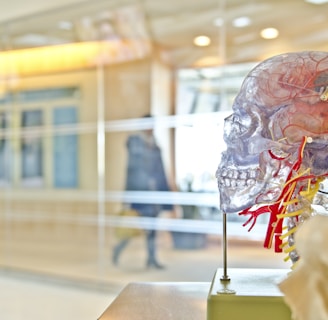Unlock Early Detection: The Hidden Lab Work That Could Save Your Brain
Rami Allan ND
6/4/20253 min read


"Alzheimer's disease begins not with memory loss, but with invisible metabolic changes that can appear decades before symptoms." – Dr. Dale Bredesen, The End of Alzheimer's Program
While traditional medicine often waits until dementia symptoms appear to act, a revolutionary approach is changing the game. Dr. Dale Bredesen and Apollo Health have pioneered comprehensive laboratory testing that uncovers hidden risk factors for Mild Cognitive Impairment (MCI) and early dementia – years before noticeable decline occurs. This "cognoscopy" represents a paradigm shift from reactive to proactive brain health.
Why Standard Testing Fails Early Detection
Conventional cognitive assessments typically evaluate:
Basic cholesterol and blood sugar levels
Thyroid function (TSH only)
Routine vitamin B12 and folate
Standard imaging only after symptom onset
The critical limitation: These tests miss the underlying drivers of neurodegeneration. Dementia isn't a single-disease process but results from multiple imbalances across 36+ identified metabolic pathways. By the time standard tests show abnormalities, significant neuronal damage has already occurred.
The Cognoscopy: Your Brain's Deep Diagnostic
The Bredesen Protocol utilizes an unprecedented 150+ biomarkers to create your brain's "metabolic map." Key hidden tests include:
Inflammation Intelligence:
High-sensitivity CRP, interleukin-6 (IL-6), TNF-alpha, and CD14+ monocyte activation detect neuroinflammation – present in 90% of pre-Alzheimer's cases.Metabolic Mastery:
Fasting insulin, HOMA-IR, and ketone bodies reveal insulin resistance in the brain ("Type 3 Diabetes"), a major contributor to amyloid processing dysfunction.Hormonal Harmony:
Free T3/reverse T3 ratios, pregnenolone, DHEA, and sex hormone metabolites impact neuronal growth factors and synaptic plasticity.Toxin Tracking:
Mycotoxin panels (for mold exposure), heavy metals (mercury/lead), and organic pollutants identify environment-triggered cognitive risks.Nutrient Nuances:
Spectracellular magnesium, zinc:copper ratio, omega-3 index, and homocysteine uncover deficiencies that starve the brain of essential cofactors.
The BRAINSCAN™ Revolution: Blood Testing for Amyloid
Apollo Health's breakthrough BRAINSCAN™ blood test now detects Alzheimer's pathology years before symptoms through three key biomarkers:
p-Tau 217: 95% accurate in predicting amyloid pathology
Neurofilament Light (NfL): Flags neuronal damage from vascular issues or trauma
Glial Fibrillary Acidic Protein (GFAP): Detects early neuroinflammation
This replaces invasive spinal taps and $5,000 PET scans, offering accessible early detection.
From Diagnosis to Action: Personalizing Your Protocol
Lab results aren't an endpoint – they're the foundation for a precision medicine approach. The ReCODE algorithm creates personalized interventions targeting YOUR specific drivers:
Insulin resistance: KetoFLEX 12/3™ diet (low-glycemic, flexible ketosis with 12-hour fasting)
Chronic inflammation: Anti-inflammatory nutraceuticals and toxin removal protocols
Trophic support: NGF-enhancing compounds and hormone optimization
Metabolic enhancement: Mitochondrial support supplements (NAD+ precursors, CoQ10)
"We've seen patients increase MoCA scores from dementia range to normal within months by addressing their specific biochemical imbalances." – Dr. Kat Toups, lead author of precision medicine dementia study
Real-World Results: Beyond Theory
Over 80% of early dementia patients showed cognitive improvement with precision medicine. Brain MRIs documented increased gray matter volume – unprecedented in Alzheimer's research.
Participants stabilized or improved MoCA scores while significantly improving HOMA-IR, hs-CRP, and vitamin D levels.
Those with high genetic risk (two ApoE4 alleles) achieved comparable results through personalized interventions.
Addressing the Elephant in the Room
Criticism of Bredesen's approach centers on costs and lack of large-scale RCTs. However, lifestyle changes promoted are widely acknowledged as beneficial. Research confirms 40% of dementia could be prevented by addressing modifiable risks – exactly what ReCODE targets.
Your Action Plan: Beyond Waiting for Symptoms
Demand Deep Labs: Request the full Bredesen panel from your physician
Consider BRAINSCAN™: If over 35 with risk factors (family history, ApoE4, head trauma)
Seek Certified Practitioners: Find ReCODE 2.0-trained clinicians
Start Foundational Prevention Today:
Adopt a 12-hour overnight fast
Eliminate processed foods and sugars
Prioritize sleep and stress management
The future of brain health isn't waiting for decline – it's detecting hidden risks and building resilience now. As Dr. Bredesen states: "Alzheimer's is not one condition, but a protective response to multiple insults. Remove the insults, and the brain can heal."
"The best time to prevent dementia was 20 years ago. The second best time is today." – Adapted for cognitive health
References:
Bredesen DE et al. Reversal of cognitive decline: A novel therapeutic program. Aging 2014;6(9)
Mammel A et al. Comparative Accuracy of p-Tau217 Assays (preprint 2024)
Toups K et al. Precision Medicine Approach to Alzheimer's Disease. J Alzheimers Dis 2022;88(4)
Bredesen DE et al. ReCODE: A Personalized, Multi-Factorial Therapeutic Program. Biomedicines 2021;9(10)